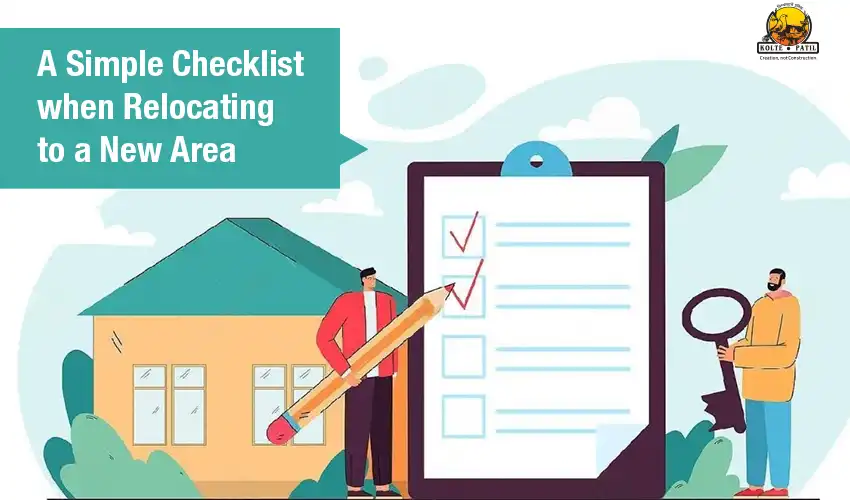
A Simple Checklist When Relocating to a New Area
“Every new beginning emerges from the end of the previous beginning!”
Moving to a new city is exciting and closing this chapter will require a few considerations.
Here is a step-by-step checklist for moving into a new house–

Click on Image to View Larger
Map out your new house
The first step of an organised moving checklist is to organise a coherent thought process. Basically, get a blueprint of your new house. Now, map out your plan according to each room design, this will give you an estimation of what essentials you need and what is unnecessary.
It also helps in determining if any extra furniture is required, which you can preorder before the move.
Categorize your belongings
There is a great protocol inspired by Marie Kondo on how to pack for a move checklist–
KonMari Method
- The process starts with imagining your ideal lifestyle.
- Prepare an ideal relocation checklist.
- Once that is sorted, categorize your belongings.
- The vital step before packing, is discarding.
- You will find it easier to sort your things. Also, you can sell them for some extra money.
Always remember ask yourself if the things you own spark joy!
List of Documents for change of address
Note: this is a must-list on the moving guide to check off at least 3-4 weeks before moving out.
Banking:
Changing your address can be done by visiting your nearest branch while also modifying your new branch details. Your Demat and trading accounts are easily transferable if you have new address proof.
Insurance:
You need to write a request letter; with your policy number and a copy of the health or insurance policy you wish to transfer. Your agent can help you with this, it takes almost 15-45 days to get approved.
Investments:
- For PPF you can transfer between banks, between banks & post offices, and from city to new city.
- For mutual funds, update your KYC. You can also update the details on the CDSL (Central Depository Services Ltd) website. You need your PAN number, upon which it may take up to 10 days for address change.
- Do not forget to officially close the locker at your current bank before moving to a new area. There is no transfer option, you will have to open a new locker.
Income Tax records:
All you need to do is update the address in the PAN details and you are sorted. NSDL (National Securities Depository Ltd) undertakes these requests.
Passport:
A passport is the most viable proof. So, as soon as you receive your new address, visit the nearest passport office branch, and fill out Form II, with valid address proof.
Ensure that you have registered for utilities
A home moving checklist must ensure that your new home is ready for your arrival. Make sure that you have registered for the following:
- Electricity
- Gas connection
- Cable/ Set-Top box connection
- Internet provider services
- Home security system
Inform the committee of your co-op housing society. Usually, they help out in the settling process and guide you through other requirements.
Pack an “essential bag” for the first few days
This is a simple hack–
It can get overwhelming to unpack everything on the same day. Heck! It may even take the next 3-4 days to sort things.
Hence, it is advised to pack a separate bag that must contain the following:
- 3-4 sets of outfits
- Toiletries and medicines
- Important documents and identity proof
- Gadgets (laptop, phone, chargers)
- Cash and cards
Relocation insurance/ transit insurance
Another reminder for the household moving checklist is to get relocation insurance. With this, you can minimize the risk of damage to your belongings while moving.
Your movers & packers’ company will provide this insurance. You can insure the following items only–
- Electrical equipment
- Home appliances
- Furniture
- Garden equipment
- Kitchen appliances
There are two main types of insurance offered–
- Transit Insurance– applicable for damages only while transporting.
- All-inclusive insurance– applicable for damages while packing, docking, and moving as well.
Explore your neighbourhood
Once you are moved in, instead of unpacking, take a breather for some time. This will help you clear out your mind from the hectic move. Explore the streets near your house. Note down important facilities around you so that it gets easier to access during emergencies.
You also get familiar with the neighbourhood, thus relieving the inhibitions about the new place.
Unpack and Donate
Lastly, get on with unpacking! Clear out boxes focusing on one room at a time.
You may encounter things that are unnecessary at the moment. You can donate it to your complex, or to the nearing NGOs.
This can create a positive impression of you in the community.
This list will ensure a stress-free transition to your new home and new beginnings!
FAQs
Q1: Do I have to pack everything by myself before moving?
A: You only have to pack your personal belongings. Everything else will be taken care of by the movers & packers.
Q2: What is moving insurance?
A: Basically, you can insure your items from damages at an affordable premium price. It is highly recommended for people moving across cities.
Q3: How much GST is charged on hiring movers & packers?
A: For only transportation- 5%
For all-inclusive service- 18%
Q4: How much would it cost if I hired packers & movers for a 2 BHK house?
A: A rough estimation for 2 BHK home belongings may cost up to Rs 4,500 – 13,000 for moving within the city. Whereas Rs 8,000 – 28,000 for outstation services. May require a 14-feet truck.
Q5: What documents are required for transit insurance?
A: it defers from case to case
- Packing list (mostly larger items)
- Transportation details
- Claim bill
- Original voice
- Bill of lading
Q6: What should I do if I have no single address proof of a new home?
A: If you are renting an apartment, your rental contract will serve as the address proof.
If you own the home, then a formal contract will suffice as your address proof.




